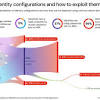Sso
2024 - 10 - 14Are You Compromising Security? The Shocking Truth Behind Single Sign-On Vulnerabilities!
Cybersecurity - Data Breaches - Identity-Based Attacks - Multi-Factor Authentication - Single Sign-OnDiscover why using Single Sign-On (SSO) might be putting your account security at risk! Are multi-factor authentication methods really doing their job?
In an increasingly digital world, organizations are adopting Single Sign-On (SSO) solutions to streamline user access and enhance productivity. However, unintentional vulnerabilities lurk beneath the surface of this convenience. A recent study reveals a startling trend: a significant portion of user accounts accessing various systems through SSO lacks one crucial defense mechanism—multifactor authentication (MFA). This leaves organizations open to identity-based attacks that could compromise sensitive data and resources.
The beauty of SSO is its simplicity; users only need to remember one password to access multiple applications. But as the saying goes, with great power comes great responsibility. Without robust multi-factor authentication in place, the convenience of SSO turns into a ticket for cybercriminals who can exploit stolen credentials. A sankey diagram from Push Security highlights a concerning reality: the majority of organizations are neglecting this primary layer of security, which puts countless accounts at risk. Every unprotected account is an open door to hackers, and the consequences of these attacks can be devastating.
Imagine waking up to a notification that your company’s confidential data has been sold on the dark web, all because of a simple oversight in security protocols. Employing MFA, even alongside SSO, can add an additional layer of defense that immediately prompts suspicion if anything unusual occurs. It's like having an extra lock on your door—a small measure that could save your organization from a potential catastrophe.
So, what can organizations do to shield themselves from these vulnerabilities? First, a reassessment of their current SSO practices is crucial, coupled with a vigorous implementation of multifactor authentication. Educating employees on the importance of security measures and encouraging them to adopt strong password practices can drastically reduce risk. In this case, it's better to be safe than sorry, as the cost of a data breach can far exceed any investments made in strengthening security.
Interestingly, did you know that hackers can target weak passwords in just a matter of minutes? Furthermore, a significant percentage of breaches are linked to poor password hygiene. Investing in comprehensive security solutions today could safeguard the future of countless organizations.

Orgs With SSO Are Vulnerable to Identity-Based Attacks (Dark Reading)
A sankey diagram showing majority of user accounts do not have multifactor authentication. Source: Push Security.
Explore the last week
- 2024 - 12 - 21, 2 topics across 21 articles.
- 2024 - 12 - 20, 23 topics across 249 articles.
- 2024 - 12 - 19, 32 topics across 482 articles.
- 2024 - 12 - 18, 30 topics across 484 articles.
- 2024 - 12 - 17, 32 topics across 441 articles.
- 2024 - 12 - 16, 31 topics across 401 articles.
- 2024 - 12 - 15, 26 topics across 411 articles.